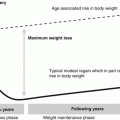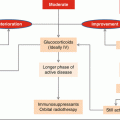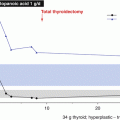Nutrient
Biomarker(s)
Symptoms of deficiency
Vitamin A
Visual impairment reduced night vision
Vitamin B1
Wernicke encephalopathy Nystagmus, ataxia Ophthalmoplegia
Peripheral neuropathy
Vitamin B12
Serum vitamin B12
Anaemia
Peripheral neuropathy
Vitamin D
Serum 25(OH) vitamin D, calcium,
Osteomalacia
Parathyroid hormone
Secondary hyperparathyroidism
Phosphate
Vitamin E
Ataxia
Neuropathy
Vitamin K
Clotting screen
Bleeding
Bruising
Folate
Red blood cell folate
Anaemia
Iron
Serum ferritin, total iron binding capacity,
Microcytic anaemia
Zinc
Plasma zinc
Acrodermatitis
Taste alterations
Alopecia
Glossitis
Copper
Serum copper
Anaemia
Neuropathy
Selenium
Serum selenium
Cardiomyopathy
Protein
Serum albumin
Oedema
Poor wound healing
At her second follow-up at 12 months following surgery, she revealed that she had recently split from her husband and had been drinking excessive amounts of alcohol. She had also received an official caution from work, pending a disciplinary hearing. Her depression had worsened and on examination she had a slight tremor. She admitted to not taking her vitamin supplements.
What are the main problems highlighted from this consultation?
This patient has developed an addiction to alcohol which has resulted in marital breakdown and problems at work. She is also non-compliant with her medication.
Premorbid Psychological Health
A range of psychological co-morbidities occur in obese individuals such as depression, anxiety and low self- esteem [14]. Also, obese patients tend to have psychosocial challenges that result in social isolation and tendency to belong to a lower socio-economic class [14, 15]. Furthermore, they are less likely to be in full time employment compared to non-obese counter parts [14].
Prior to bariatric surgery, a psychological evaluation is undertaken to assess readiness for surgery and manage patient’s expectations following their operation. Also it is an opportunity to identify any potential contraindications such as active suicidal behaviour, hallucinations, delusions and severe cognitive impairment [16].
Post-operative Psychological Health
A prospective controlled study involving 4,047 obese patients showed a significant improvement in quality of life and a decrease in depression and anxiety in the first year following surgery compared to obese controls treated with diet and counselling [8, 17].
However, there are reports of patient’s mental health returning to their pre-operative state or even deteriorating after 2–3 years [18].
Eating Disorders
There is also evidence to suggest that some patients do develop post-surgical eating disorders such as anorexia nervosa and bulimia. The suggested mechanism behind this is that patients either develop eating avoidance behaviours due to discomfort from early satiety induced by gastric restriction or patients fail to psychologically adjust to food portion sizes leading to bulimia [19, 20].
Addiction
There is some anecdotal evidence to suggest that patients develop a “transfer addiction,” i.e., from food to alcohol after bariatric surgery. Alcohol has been recognised as a high risk substance of abuse in bariatric patients. Gastric bypass operations alter the metabolism of alcohol, which may enhance its effects [19, 21, 22].
The choice of alcohol is affected as patients prefer to abuse spirits as opposed to beer which require larger amounts to achieve the desired effects. It would be prudent in such patients to also screen for thiamine deficiency as there is a risk of developing Wernickes-Korsakoff syndrome from both the bariatric surgery and alcohol abuse [10]. A negative change in behaviour could potentially exacerbate psychosocial problems both at home and the work place.
Interpersonal Relationships
There have been reports of high divorce rates and relationship break downs following surgery. This can be attributable to the patient and their partner struggling with their new body image. Relationship dynamics can change if the patient gets more attention from other suitors thereby boosting their self-esteem, resulting in promiscuity. Finally, new-gained self- confidence can trigger patients to leave particularly abusive relationships in search of a better life [23].
At her third follow up her weight had increased to 170 kg. She was notably breathless during the consultation. She revealed that she has been experiencing dizziness and sweatiness following a meal. This was relieved by eating a snack. As a consequence her appetite had increased. She also complained of increased breathlessness on minimal exertion and had suffered from paroxysmal nocturnal dyspnoea for the last 2 months. On examination there was evidence of bilateral pitting oedema with a splint on her left wrist following a hairline fracture after a fainting episode.
What is the differential diagnosis?
Dumping Syndrome
This patient is describing features of dumping syndrome. This phenomenon arises as a result of food high in sugar and fat being delivered largely undigested to the small intestine causing osmotic overload. Fluid is drawn into the intestinal lumen by osmosis stimulating a vagal reaction [24]. Patients present with abdominal cramps, sweating, nausea, diarrhoea, flushing, tachycardia and syncope [10]. Dumping syndrome can occur in up to 70–76 % of patients who have had RYGB [5, 10, 25]. Symptoms tend to become less prominent with time, however if proven difficult, avoidance of energy dense foods can be effective [10]. Medical treatment includes Octreotide and Arcabose. Patients who suffer from frequent episodes of dumping syndrome should not be offered slow release preparation of tablets due to incomplete absorption by the digestive tract [3].
Cardiomyopathy
This patient appears to be developing symptomatic cardiac failure. She has admitted to not taking her vitamin supplements and it is likely that she has developed Selenium deficiency which can lead to cardiomyopathy. Selenium is a trace element which is a component of glutathione peroxidase, an enzyme that may help prevent oxidative damage to cells. There have been numerous case reports of congestive cardiomyopathy as a result of Selenium deficiency. This is fully reversible upon selenium supplementation [26, 27].
Metabolic Bone Disease
She has developed a fracture following a syncopal episode due to dumping syndrome. This fracture is as a result of metabolic bone disease secondary to bariatric surgery. Voluntary weight loss due to any cause in an obese person results in approximately 1–2 % bone loss in all sites [28]. This correlates with the speed of weight loss [29].
Metabolic bone disease in obese patients is due to a number of factors such as inadequate intake of calcium and vitamin D post-operatively [30]. Also malabsorptive bariatric surgery results in reduced absorption of calcium and vitamin D due to bypass of the duodenum and proximal jejunum [30]. This results in a rise in Parathyroid hormone (PTH), i.e., secondary hyperparathyroidism, leading to increased bone resorption [28].
It is a phenomenon which has been demonstrated in large studies with up to 70 % of patients who have had malabsorptive surgery being affected [28, 31]. Patients can present with bone and joint pain, muscle weakness and fatigue. In extreme cases they present with bone fractures [30].
Monitoring of patients can be carried out by measuring calcium, PTH and vitamin D levels every 6 months for the first 2 years then annually. Objective measurements of bone mass density can be carried out by using annual dual-energy x-ray absorptiometry (DEXA) scan to quantify the degree of bone loss pre and post operatively until bone mineral density is stable [10, 28].
Management of this condition is mainly preventative by giving vitamin D and calcium supplements. There is a scarcity of data on the use of bisphosphonates in such patients who have had bariatric surgery [28].
Weight Regain
This patient has started to regain weight. The vast majority of weight loss occurs in the first year. At 18–24 months most patients reach a weight loss plateau and in some cases, suffer from weight regain [10, 24].
Patients need to be regularly reviewed by a dietitian to re-enforce changes in nutritional habits such as avoiding or minimising carbohydrate dense foods which can lead to dumping. One of the symptoms of dumping syndrome is hunger, as a result patients tend to continuously eat to alleviate symptoms leading to weight gain [10].
See Table 25.2 for the causes of and ways of preventing weight re-gain
Table 25.2




Causes and prevention of weight gain
Stay updated, free articles. Join our Telegram channel

Full access? Get Clinical Tree







